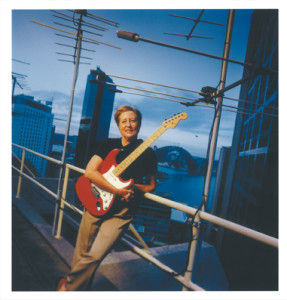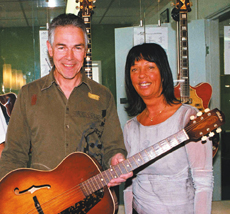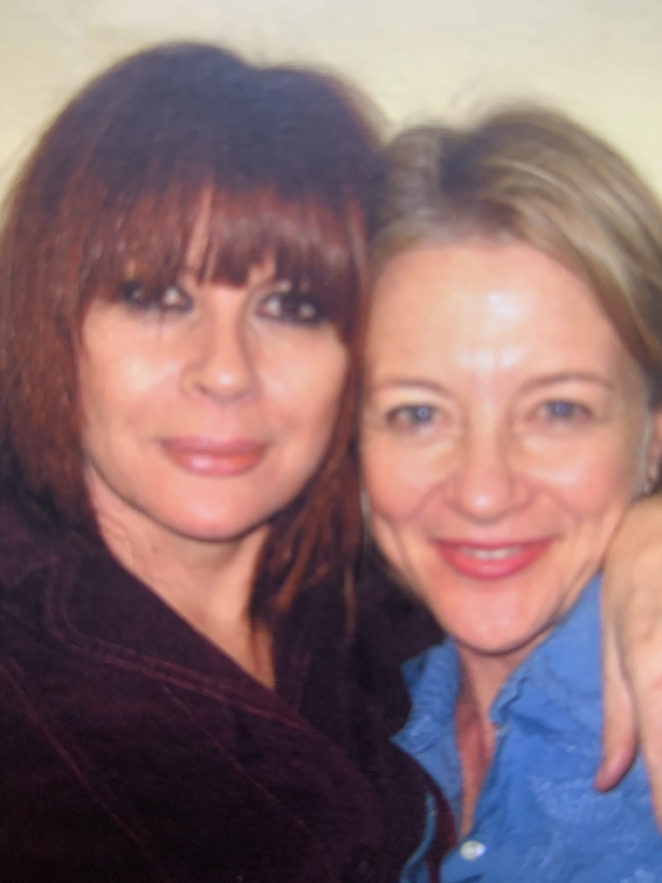AUSTRALIA’S GREAT INDUSTRY UNSUNG
November 29, 2007 | Author: Mary Mihelakos
Sometimes it feels as though women have completely fallen off the radar when we talk about the music industry. Women have been there all along, performing and working behind the scenes. They are CEOs of companies, promoters, managers, agents, engineers, publicists, musical equipment distributors, teachers and more. MARY MIHELAKOS takes a look at the music industry present and past, recognises the achievements of various women within it and assesses future improvements. There are thousands of amazing women working behind the scenes of the Australian music industry; we only have limited space to highlight a handful of them.

My first interview is with Margaret O’Loughlin who is the Managing Director of Fender Australia. I call the Fender office and she answers the phone. “If the phone rings, you answer it, it’s simple,” she says. It is not often that a CEO of a company answers the general phone line. But I suppose this commitment is one of the reasons Fender is so successful.
Margaret O’Loughlin has been running Fender Australia since 1982, taking over the business after her husband passed away. “When I first started in the industry it was hard – just me, an answering machine and a family to raise. But, I had one huge advantage. I had a great product to work with – the best!” Margaret has steered Fender to the success it is today, but freely admits that without great support, vision and passion from her staff, and dealer network, there would be no Fender story to tell.
Linda Kitchen is the Managing Director of Maton Guitars. The Australian company was started by her father, Bill May, 61 years ago. Maton Guitars have always been a part of Linda’s life, it’s the family business. “Mum and dad ran the business, they were a great force,” she says. She now runs the business with her husband Neville and they have four children. Some of them work for Maton. “Being the head woman was an issue when I first started,” says Linda. “People would ring up, speak to me and they would want to speak to the boss because it had to be a male, you know. It was very difficult and it took a long time before I was accepted. But I was pretty up front and usually spoke my mind, depending on who it was, if I could be bothered or not. But I would make my presence known.”

“I’d love to see more women getting in there. And there are so many great female artists; Maton endorse Fiona Boyes and Deborah Conway and other women who have come and gone,” states Linda.
There is a huge gender imbalance in the technical arena when it comes to the music industry. There are hardly any Australian female studio producers although women have completed courses at SAE and JMC Academies; some are working in broadcasting and theatre. However there are a few women working in live mixing, lighting and event production.
“I think they get put off by the male dominated environment, a lot of girls can’t handle being around that many guys and it is very unnerving,” says Shannon Ward who works as a lighting technician for Paul Kelly, The Beautiful Girls and Julia & Angus Stone. “It is not the easiest industry to get in to. You have to start at the bottom and work your way up. I started in the industry 11 years ago working at the Perth Entertainment Centre. I started as a cleaner there and I saw the guys working backstage and hassled until they gave me a job.”
Kate Stewart has a wealth of experience in the music industry, managing You Am I during their first ten years, tour managing and looking after the production crews for the Big Day Out. Although Kate loves her work, she says it has not been easy. “Over the years I’ve started to think more and more that it is a boys club. Men see a woman who knows what she is doing and they are threatened.” The work itself is also tough, “As production manager you’re the first person in a venue and the last one out.”
Sally Laver in her own words, is a ‘jack of all trades’. Her list of credits includes mixer, venue booker, production manager for the Queenscliff Music Festival, tour manager for Feel Presents and bill payer of Geelong’s Pan Studios (rehearsals and recordings) for 14 years. “I really enjoy being hands on. I am not really good at the office work,” says Sally. “If you’re a female you do have to make your own work. But there is a bit of a ceiling for us, especially mixers. We don’t usually get a look in with the big touring bands. We can’t quite break in to that next level. I think some people are scared that girls can’t do the job. With production they assume girls can’t lift and load. I can lift a quad box, no dramas.”
Stephanie Bourke opened up a music school in Melbourne between 1990 and 2001 called Rock N Roll High School. She taught popular and alternative music to students and created a girl friendly environment which empowered women to pick up an instrument. Many of the teachers played in local bands and the students were encouraged to form groups and gain live experience. Rock N Roll High School was regularly visited by international touring acts including Sonic Youth, Dinosaur Jnr, Hole, and The Beastie Boys and they also released a series of compilations. For a decade, girls in bands played venues every weekend; a change in the gender imbalance unique to Melbourne. Some bands went on to play national tours and receive national exposure; one band became the first group of Australian girls to sign an international record deal (BMG).
Tracy Wall runs a company called Safety In Numbers and specialises in all the logistics of events and production. She is the site manager for the Melbourne Big Day Out and also looks after logistics for many of the big dance festivals and events. “There is always room for more women in production, perhaps now with more education and courses available there will be more opportunities.”
Jill Shelton is a teacher in the Diploma of Music Industry (Technical Production) course at RMIT University. “We need to close the gender gap in the technical arena,” explains Jill. “It is a male enclave. We need to be pro-active and change the culture and introduce women to sound production as a viable career pathway.” During the 1990s Jill Shelton managed successful indigenous three-piece, Tiddas. “We were a posse of five women,” says Jill who points out that their live sound engineer was also a woman, Janine Temme. “That was formidable. Tiddas were mouthy, assertive and always spoke their mind.” Jill Shelton has continued to be a band manager and represents Archie Roach. Jill sights that it is important to have role models in this industry, for her it was The Cruel Sea’s manager, Wendy Boyes-Hunter.
If there is a particular field in the music industry where women have continued to excel, it is in artist management. There are and have been many great female managers in Australia including Kim Frankiewicz (INXS, Jenny Morris), Fiona Duncan (Spiderbait), Bernadette Ryan (Architecture In Helsinki, The Avalanches, CW Stoneking) and dynamic new comers like Bonnie Dalton (Little Red). Top end acts such as The Living End, The Cat Empire and Eskimo Joe all have female managers.
One of the hardest working women in the music business is Rae Harvey, who established her management company Crucial Music in her late teens in early 1990s. The manager of The Living End, Gyroscope and Children Collide says, “I never thought about the gender aspect at all. I was organising All Ages shows and fell into management accidentally. I think men and women are different, we fulfil different roles on the planet. Women are generally better organised.” Rae continues, “From my point of view, managers need to have great organisational and caring skills. That is why there are so many great women managers.”
Correne Wilke started managing The Cat Empire six years ago. On the eve of starting an executive job in an advertising agency Correne went along to The Saint in St Kilda to see her friend’s band The Cat Empire play live. She knew instantly that this band had a huge future and she immediately started to manage them. She never went to work the next day and has never looked back. Within months The Cat Empire were filling venues all over Melbourne. Now the band can fill a live venue almost anywhere in the world. “The job of management is to be a bit of a visionary. I always had my mind on the big picture while a lot of people get sidetracked with the next gig,” reveals Correne.
Manager of Eskimo Joe, Catherine Haridy was working for major record companies before taking on artist management. It was a bold move for Catherine to set up her own management company and quit her position as A&R Manager for Warner Music Australia. “The opportunity to create my own destiny and make my own choices – right or wrong,” is what appealed to Catherine. “It was a risk to take, most certainly, but a calculated one and one I’m most proud of and have enjoyed immensely to date,” she says. “The work is harder in the sense that I spend more time away and greater hours working, but it’s worth it when it’s your own business you’re building.”
Record companies represent the more glamourous end of the music industry.
However there’s a glass ceiling for women who generally don’t go beyond middle management and are in traditional support roles as assistants and promotions. Many of the top Australian female record executives have had to move overseas to land higher posts. There have only been a handful of women in top positions within record companies in Australia. Fifa Riccobono has an amazing success story and is an inspiration. Fifa started at Albert Productions in 1969 at the age of 16, as secretary to the professional manager and worked her way up to become the CEO of the music company. Although she is still involved with Albert Productions, Fifa has taken on a new role with the company as music industry consultant.
She always had close working relationships with all her artists who included AC/DC, Stevie Wright, Ted Mulry, John Paul Young, Rose Tattoo and The Angels.
Fifa says that in Australia in the 70s it was quite an exception that a woman was in a managerial position in a music company. “There were absolutely more women working for record and publishing companies in key positions overseas. I’ve always believed that if you’re successful, no one cares if you’re male or female, whatever industry you’re in. However, with the consolidation of the majors in a shrinking market it appears that there are fewer women as major key players in the music industry particularly in Australia.”
“The only reason I guess I had such confidence in the work I did was that my staunchest supporters were Ted Albert, George Young and Harry Vanda. They backed me 100% on everything I did because I was with them from the inception of the Albert Productions label and we had a really strong working relationship.” Fifa often went on tour with AC/DC both in Australia and overseas. Some of her favourite highlights were, “When I went to Rio in 1985 with AC/DC and Rio just about did itself in; Carnivale was lukewarm after their show. In 1991 I went to the Moscow gig they did at the airfield – and that was just unbelievable. When you consider they started doing gigs at Checkers in the 70s where they used to do three sets a night and play in front of seven people in the first set and then potentially 30 people by the last set, and going on to one million in Moscow. It’s been an amazing journey.” Will Fifa be writing a book one day? “I have not ruled it out,” she quips.
Moira Bennett has also been one of the few women in Australia to head up a record company. She headed up Virgin Records Australia for seven years and started the Massive Label, Mighty Boy Records and Little Big Music. She now resides on the Mornington Peninsula and works in Real Estate. Having run labels since the 1970s. Moira was often the only woman in a board room. “Sometimes I felt like the novelty. I used to have to go in to these meetings where there were some old fogies who used to look at me wondering if I had slept with everybody to get there,” recalls Moira.
“A lot of great women in the music industry are quiet achievers,” says Sarah Morgan who has worked at Mushroom Records on and off since 1990. Sarah is one of the many astounding women who has been employed by Michael Gudinski’s companies alongside Eleanor McKay, Mary Bainbridge, Denise D’Sylva, Janet Dawes, Linda Bosidis just to name a few.
Sharon Ashworth has worked at various record companies including Shock, Mute, EMI, Polygram and Festival stepping in to roles such as A&R and label managing which were traditionally held by males. Because the Australian music industry is so small, it has been easier to acquire a broad base of skills. Ashworth has applied her marketing skills and experience and moved in to the rapidly growing world of digital media. She is now General Manager for Destra, distributing music catalogues through mobile carriers.
Music publisher and one time president of the Australian Songwriters Association, Colleen Zulian is an entrepreneur. Over seven years she developed her idea into the Asia Sounds company. She recently launched Sutasi, a broadcasted campaign to discover Asia’s best songwriter and singer. The winners are matched with global songwriters and producers with the opportunity to break in to western mainstream. Colleen now has offices in New York, Los Angeles, Singapore and Melbourne. Colleen says it was not easy getting support from the Australian music industry, whereas people in the US industry were immediately behind her. “Women in the United States get more kudos and hold higher positions than they do here.”
Chrissie Vincent has been running her own publicity firm since 1999 after many years of experience in the music industry. Chrissie started in promotions at Triple M in the 80s and went on to work at Virgin Records in LA and MTV Australia. However what inspired Chrissie to set up her own company were the limited opportunities for women, “If I am only going to be promoted as far as a promotions job at a record label, I may as well run my own PR firm.”
A couple of other leading ladies worth noting, who also run their own high profile PR companies include PAULA ‘JONESY’ JONES and CHRISSIE CAMP.
Gaynor Crawford agrees that it is harder for women who work for corporate companies in music. Gaynor started her career in New Zealand in the late 1970s working in radio and then for CBS Records. For many years Gaynor has been based in Coffs Harbour running her own publicity company and co-promoting folk and roots acts such as Rodrigo Y Gabriela, Damien Rice, The Frames, Rufus Wainwright, Martha Wainwright and Patty Griffin. She considers herself to be on the periphery of the music industry and her longevity assured by being self employed. “From where I am nothing affects me. I stand outside the square. I don’t run with the pack, never have, never will.”
Although there are many women booking venues all over Australia there are very few female booking agents and tour promoters and festival organisers. With a background as a booking agent and manager Renee Rudolph is a tour promoter who runs her own company called Thirteenth and co-promotes with Chugg Entertainment. “There are always battles,” Renee says. “But you just have to be tough and not take no for an answer.”
Sahara Herald Shepherd is the National Coordinator of the Big Day Out and producer of the Legs 11 concerts. She is tough, fair and one of the most generous women in the industry. “There are hardly any female promoters in Australia. I know of one particular male promoter who has expounded the theory that ‘women don’t make good promoters because they’re not naturally gamblers’. I’ve certainly felt the need to prove myself by working beyond the call of duty. But I’m luckily in the position now where my reputation for hard work, delivery and commitment open pretty much any door. And at the end of the day I love music and feel pretty privileged to be doing what I do and to regularly work with an amazing bunch of women in all facets of the industry. They have not only been a great influence on me personally but on the music business in general such as Kate Stewart, Jessica Ducrou, Viv Fantin and Linda Bosidis. I work my buns off to do my job, but in fact, I feel pretty blessed most of the time!”

Tracee Hutchison is a respected journalist and broadcaster who has worked in radio and television for over 20 years and is also a published author. Although her experience goes beyond the music industry, Tracee is particularly passionate about it and has made significant contributions. “I look around and see a handful of women succeeding and a whole lot of men running the show. A handful of women have always succeeded. But women have to be so much more capable, so much more flexible, so much more diplomatic, so much more amiable – because if you don’t do all of those things guess what? You get called ‘difficult’.”
In light of the recent Aria Awards clean up by Silverchair, Tracee relates an experience where she believes her gender has played a role in how the band’s story is sometimes told. As producer of the SBS music program ‘nomad’ she ran the Pick Me competition, which is how The Innocent Criminals (later Silverchair) were discovered. Her decision to go with them would subsequently be challenged by the band’s biographer. “It’s true they very nearly didn’t win. I wasn’t looking for three white kids from Merewether. I was trying to keep my TV show on air and I wanted to find a quintessential ‘SBS band’. But they had the best song. And my show got axed!
“But then Jeff Apter wrote this book about Silverchair and just couldn’t accept that it was ultimately my decision about who won that little competition. If I was a bloke this would never have happened – I would have been offered an A&R role within a month! I just think that many men in the music industry have extraordinary difficulty accepting women might have a creative capacity that matches – or betters – their own.”
Lindy Morrison was the drummer in The Go Betweens between 1980 and 1991 and has become a very effective music administrator and lobbyist. She is the Artist Director on PPCA Board since 1993 and the National Co-ordinator for Support Act, the musicians’ benevolent society. “What worries me is that young women just don’t talk about it any more. I have said it for such a long time that it is a real struggle for women to get ahead in the music industry and it is a blokey culture. No one talks about it,” tells Lindy.
“Up until the late 60s women were not allowed to drink in bars. It took a big movement of women chaining themselves to bars, so women could have access to bars. Part of the problem was that in the 70s bars were traditionally masculine that is why the pub rock scene was very blokey. That is the core of our music industry and where the leaders of our music industry have come from.”
Vanessa Brady is the national administrator for the Music Managers’ Forum who has a background in record companies, campus activities, publicity, youth and government programs. Vanessa agrees that women face additional challenges, “I know feminism is a dirty word for many, but if it wasn’t for the feminist movement in the first place we wouldn’t even be able to voice these opinions. Women do all the work in the background while men take the credit.”
“There is an attitude behind the scenes that there is an incredibly long queue of people wanting to get into this industry so we don’t have to treat you very well. We don’t care whether you stay here or not and we’re certainly not going to pay you very well.
“It is the opposite to every other industry. I am hoping this generation with more education and training behind maybe able to make some changes.”
The writer Mary Mihelakos is former Beat editor, ex-venue booker and founder of the Australian BBQ at SXSW and has started her own company called Stage Mothers


